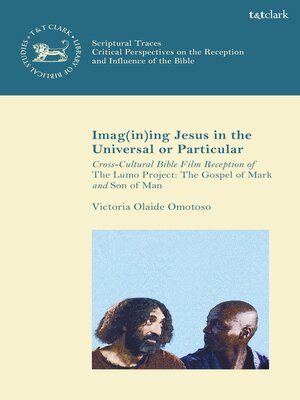Imag(in)ing Jesus in the Universal or Particular
ebook ∣ Cross-Cultural Bible Film Reception of The Lumo Project: The Gospel of Mark and Son of Man · The Library of New Testament Studies
By Victoria Olaide Omotoso

Sign up to save your library
With an OverDrive account, you can save your favorite libraries for at-a-glance information about availability. Find out more about OverDrive accounts.
Find this title in Libby, the library reading app by OverDrive.



Search for a digital library with this title
Title found at these libraries:
| Library Name | Distance |
|---|---|
| Loading... |
This volume is a critical exploration of cross-cultural Bible film reception presented through an analysis of the responses of UK and South African audiences to The Lumo Project: The Gospel of Mark (2014) and Son of Man (2006). Victoria Olaide Omotoso places emphasis on audience reception and highlighting the non-Western experience of biblical films by examining the responses of audiences from different cultural contexts to identical media, with a cross-cultural audience discourse facilitated by cultural dynamics: fidelity to the (biblical) text, ethnicity, music, and gender. By examining historic and cinematic debates, audience responses and filmmaker responses, Omotoso explores the ethnicity of Jesus, theological contexts and implications, and the presentation of Jesus in an androcentric world.
Omotoso adopts the concepts of universality and particularity as frameworks to determine the ways through which the filmmakers attempt to identify their cinematic visions and locations. She defines universality as a phenomenon through which the filmmaker seeks to place the narrative within a trans-cultural frame for a global audience; in contrast, her definition of particularity is envisioning a unitary and specific cultural context for the narrative. By exploring fidelity to the text, the ethnic identity of Jesus, musical contexts, masculinity and female agency, the universal and particular are shown as complex, contested, and shifting concepts within the process of cross-cultural audience reception, which frequently destabilizes the intentions of the filmmakers.
Omotoso adopts the concepts of universality and particularity as frameworks to determine the ways through which the filmmakers attempt to identify their cinematic visions and locations. She defines universality as a phenomenon through which the filmmaker seeks to place the narrative within a trans-cultural frame for a global audience; in contrast, her definition of particularity is envisioning a unitary and specific cultural context for the narrative. By exploring fidelity to the text, the ethnic identity of Jesus, musical contexts, masculinity and female agency, the universal and particular are shown as complex, contested, and shifting concepts within the process of cross-cultural audience reception, which frequently destabilizes the intentions of the filmmakers.







